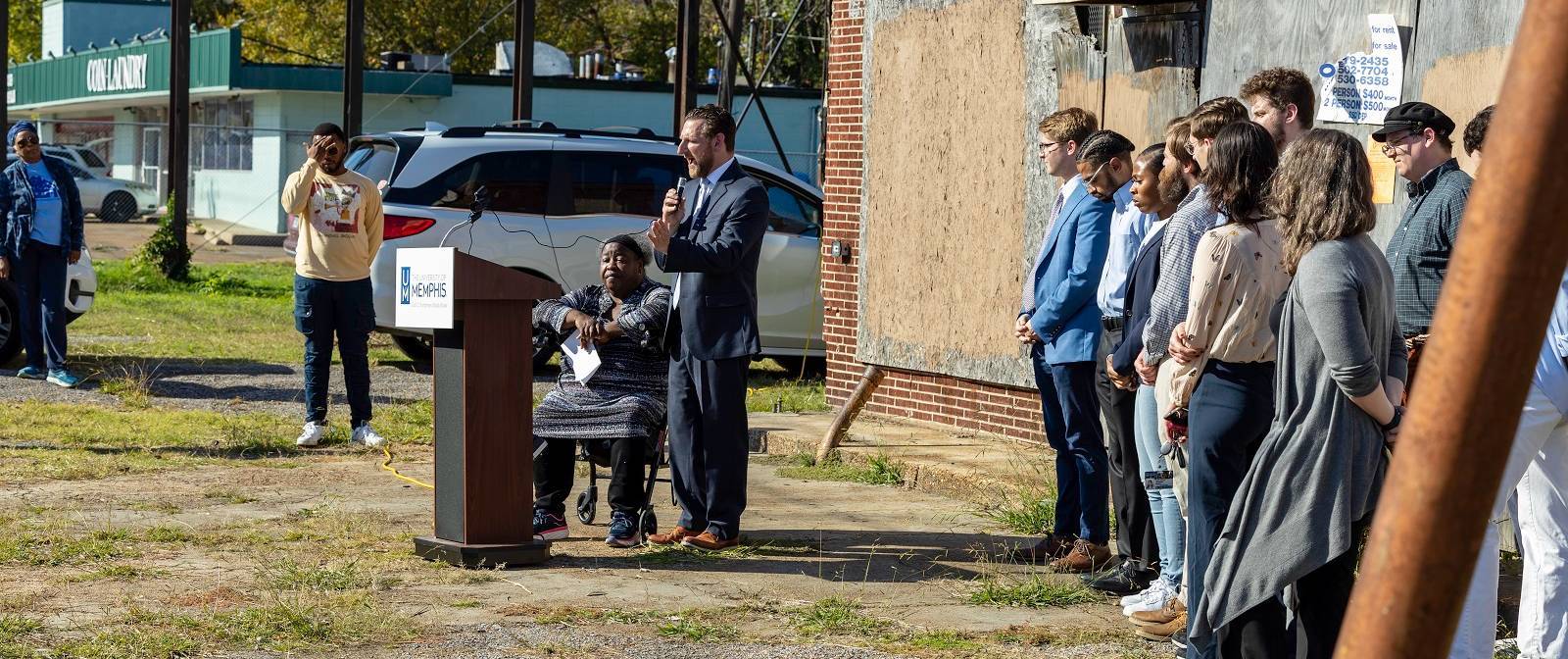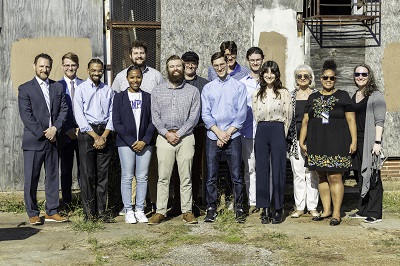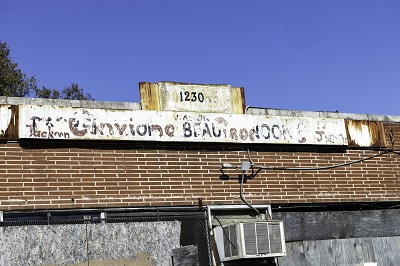School of Law
NEIGHBORHOOD PRESERVATION CLINIC FIGHTS BLIGHT IN NORTH MEMPHIS

Blighted and abandoned properties continue to be some of the biggest issues many communities in Memphis face.
Recently, the law school’s Neighborhood Preservation Clinic and the Klondike Smokey City Community Development Corporation announced litigation that they hope will bring the North Memphis community back to some of the vitality that the neighborhood previously embodied before it was overwhelmed with neglect and disinvestment.
The Neighborhood Preservation Clinic at the University of Memphis Cecil C. Humphreys School of Law recently filed 25 Tennessee Neighborhood Preservation Act lawsuits on behalf of the Klondike/Smokey City CDC against vacant and abandoned properties in the neighborhood. Working under faculty and staff attorney supervision, Clinic law students will handle all aspects of the cases as they proceed in the Shelby County Environmental Court.
 Over the years these properties have become vacant and blighted due to a variety of
reasons. Oftentimes it is due to the death of the original owner, in which case the
ownership falls into the hands of a family member who may not even know they have
rights to the property (or responsibilities). Other times, the property belongs to
an out-of-town corporation or investor who are less likely to appreciate the ramifications
of their disinvestment in the property.
Over the years these properties have become vacant and blighted due to a variety of
reasons. Oftentimes it is due to the death of the original owner, in which case the
ownership falls into the hands of a family member who may not even know they have
rights to the property (or responsibilities). Other times, the property belongs to
an out-of-town corporation or investor who are less likely to appreciate the ramifications
of their disinvestment in the property.
“The story of each individual property is often what holds the key to solving that property, bring it back to life,” said Memphis Law Professor Danny Schaffzin, director of the law school’s experiential learning program and co-director of the Neighborhood Preservation Clinic. “There’s not a right to blight. Fundamental property rights are an issue at every point in these cases, even when the owner is, by every indication, by all the outward signs, not doing anything to not only keep the property up but keep it safe and out of everybody else’s way.”
Under the NPA, the plaintiff does not sue the owner of the property. Rather, the civil lawsuit is brought directly against the vacant property in question.
Unlike a typical lawsuit, the plaintiff does not seek monetary damages, nor do they wish to seek possession of the property.
Instead, the plaintiff in the lawsuit asks the court to find that the property is a public nuisance. Upon that determination, the court will enter an order that requires the owner of the defendant property to present a written plan to abate its nuisance condition.
“These cases are not about money,” Schaffzin said. “These cases are not about Klondike/Smokey City Community Development Corp. taking these properties. Ideally, once the nuisance condition of these properties is abated, once a property is brought back up to speed, up to productive use, either through demolition, but hopefully through rehabilitation, the cases are dismissed.”
The law students working on these cases report back to Environmental Court every four to six weeks and handle the majority of the work related to the lawsuits.

“Although we have supervision from our bosses, we’re the ones presenting the cases, we’re the ones doing all the work behind them,” says Hunter Martin, one of the students enrolled in the clinic and assisting with the cases. He said the Neighborhood Preservation Clinic has helped him learn and expand his experience in the legal world.
“This clinic has been extremely beneficial, in my perspective, in advancing my abilities to be an advocate, which is the most important part of law school,” said Martin. “It’s an eyeopener, and it really makes it more real.”
These new lawsuits represent the first time the Clinic is representing a non-profit organization in Neighborhood Preservation Act litigation. Since its founding in January 2015, the UofM Neighborhood Preservation Clinic has represented the City of Memphis in more than 1000 public nuisance lawsuits seeking the abatement of badly neglected, vacant and abandoned properties throughout the City
